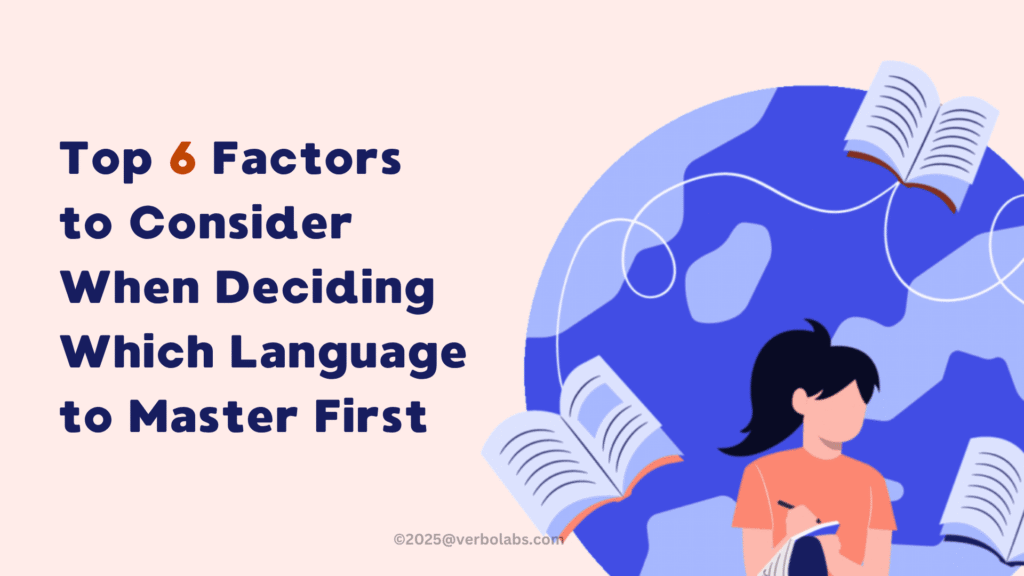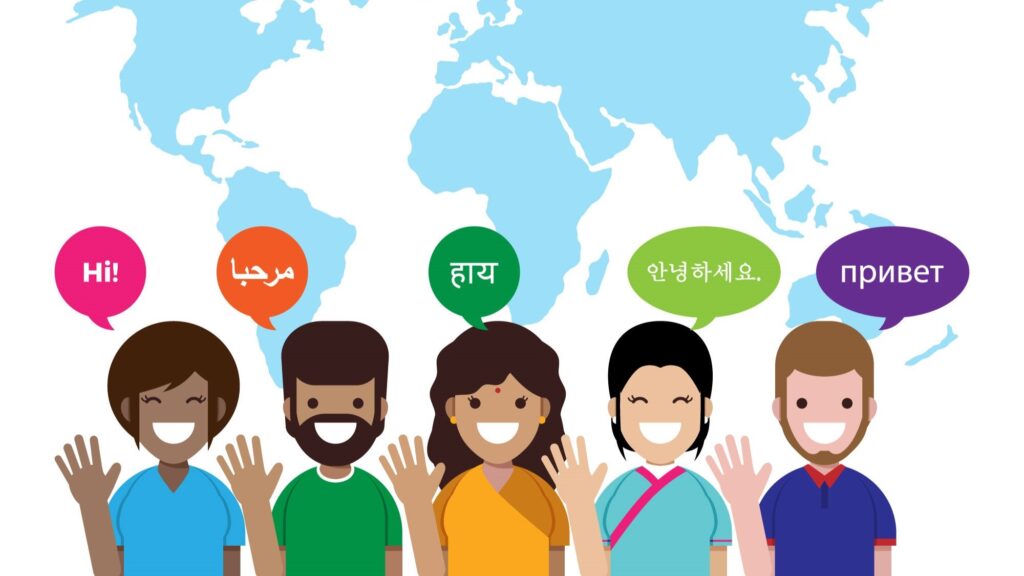
Did you know that over 1.5 billion people globally are learning a foreign language right now? Whether you’re doing it for career advancement, international travel, or personal growth, choosing the right language to learn can be overwhelming. With over 7,000 languages spoken around the world, how do you decide where to begin?
At VerboLabs, we work with over 120+ languages across translation, dubbing, and localization services. So, we understand how language preferences vary by industry, location, and personal goals. If you’re wondering which language to learn first, here are the six most important factors you should consider—along with how VerboLabs can help you apply your language skills globally.
1. How Much Time Can You Dedicate to Learning a Language?
Your schedule plays a massive role in deciding which language to learn. Some languages take far longer to master than others.
For example:
- A native English speaker may need 600 hours to learn Spanish or French, but over 2,200 hours to learn Mandarin Chinese or Arabic, according to the U.S. Foreign Service Institute.
If your time is limited, it’s better to choose a language closely related to your native tongue. European languages like Spanish, Italian, or Dutch often share vocabulary, grammar, or sentence structure with English.
On the other hand, if you’re willing to invest long-term effort, languages like Japanese, Korean, or Russian open doors to specialized markets and cultures.
Tip: Choose a language based on your timeline and goals. Short on time? Pick a familiar linguistic group. Have long-term aspirations? Explore complex, high-demand languages.
2. Which Language Offers Better Career Opportunities?
Language skills can give you a competitive edge in the global job market.
Some in-demand languages based on 2025 job market trends:
- Mandarin Chinese – Crucial for business in China’s manufacturing, e-commerce, and fintech sectors.
- German – Key for engineering, automotive, and scientific industries in Europe.
- Spanish – Widely used across the U.S., Latin America, and Spain—great for marketing, healthcare, and tourism.
Many multinational corporations actively seek bilingual or multilingual professionals for roles in customer service, localization, international sales, and project management.
VerboLabs Insight: Our clients in the eLearning, tech, and entertainment sectors often demand localized content in French, Portuguese, Japanese, and Arabic—languages with rising global influence.
Tip: Align your language choice with your career goals and the industries you plan to enter.
What Languages Are Common in Your Community or Country?
If you’re not planning to travel abroad soon, choose a language that’s useful locally.
For example:
- In India, Hindi, Tamil, Bengali, and Marathi dominate regional communication.
- In the United States, Spanish is the second-most spoken language after English.
- In Canada, French is an official language used in government and education.
Learning a language spoken in your surroundings increases opportunities to practice daily. Plus, it may help you connect with local communities, serve diverse customers, or expand your freelance and teaching options.
Tip: Look at census or regional data to discover the most useful second languages around you.
3. How Easily Can You Access Learning Resources?
Some languages have countless learning apps, courses, and books, while others have very limited materials. Popular languages like French, Spanish, and Japanese are supported by platforms like:
- Duolingo
- Babbel
- Coursera
- YouTube language tutorials
- Language learning podcasts
But for lesser-known or indigenous languages, resources may be scarce.
Tip: If you’re a beginner, opt for a language that offers a rich ecosystem of multimedia resources—books, subtitled videos, apps, and flashcards.
5. Do You Have Access to Native Speakers and Content?
To truly become fluent, you need regular exposure to native-level content and conversation. Whether it’s through language exchange platforms, immersion trips, or bilingual friends, speaking with native speakers improves pronunciation, idiomatic understanding, and cultural context.
Thanks to the internet, you can now:
- Watch native shows on Netflix with subtitles
- Join online communities or conversation groups
- Use tools like Tandem or HelloTalk to connect with native speakers
VerboLabs Tip: Native content is also vital for localization. At VerboLabs, our team includes native linguists who translate and adapt content with cultural accuracy—because even perfect grammar doesn’t guarantee local relevance.
Tip: Choose a language where you can regularly practice with native speakers or consume native content.
6. What Drives Your Personal Interest or Motivation?
Motivation is the strongest fuel for language learning. Are you passionate about K-pop, Japanese anime, or Spanish telenovelas? Do you dream of reading Dostoevsky in Russian or traveling to Italy?
When your reason to learn is personal, you’re more likely to stay consistent and enjoy the process—even when grammar gets tricky.
Tip: Make it personal. Whether it’s travel, literature, relationships, or entertainment, let your interests guide your language choice.
Let VerboLabs Help You Go Global With Your Language Skills

Whether you’re an individual or a business exploring multilingual communication, VerboLabs is your trusted partner for professional language solutions.
Why Choose VerboLabs?
- 120+ languages covered, including rare dialects
- AI-powered + human-reviewed translations for speed and accuracy
- Dubbing and Voiceover services in native accents for global reach
- eLearning localization, document translation, video subtitling, and more
- Trusted by Fortune 500 companies, educators, content creators, and developers worldwide
Whether you’re mastering a new language or expanding content across borders, our team ensures cultural relevance, native fluency, and technical precision.
Conclusion
Choosing which language to master first isn’t just about popularity—it’s about purpose. From your professional ambitions to the time you can commit, and from access to native content to personal passion, all these factors influence your learning journey.
By considering these six elements carefully, you’ll set yourself up for success in both language learning and real-world application.
And when you’re ready to take your new skills global, VerboLabs is here to translate, localize, and amplify your message worldwide.





